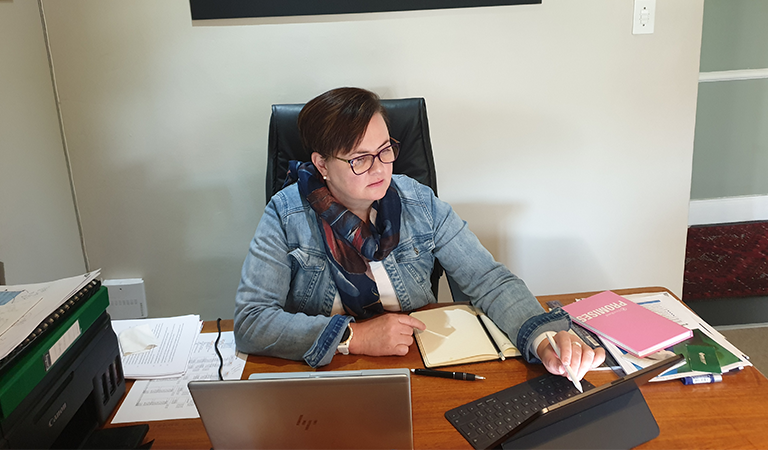April 2020 // Johannesburg
Mental health/resilience in a time of COVID-19

As we continue to navigate the national lockdown, the one thing that has been of great importance for me is mental resilience: how am I taking care of my own mental health? How are we taking care of our staff members, our colleagues and partners? Are we checking in regularly enough to ask ‘how are you doing?’ and are we staying on the phone, Zoom or Skype call long enough to hear the answers and help where we can?
Anxiety levels are at an all-time high, caused by fear and uncertainty as we face something the majority of us have never experienced before. In the beginning this seemed like a ‘welcomed reprieve’ from the daily ‘hustle’, but the novelty of online yoga classes, digital meditation sessions and learning to bake banana bread ten different ways, the gravity of the situation is setting in – for many this means sleepless nights, the inability to work productively and feelings that are similar to the stages of grief.
Are we checking in regularly enough to ask ‘how are you doing?’ and are we staying on the phone, Zoom or Skype call long enough to hear the answers and help where we can?
There is a lot of information about how best to deal with mental health during these times. In an article in the FT titled Homeworking: isolation, anxiety and burnout, where Nick Bloom, senior fellow at Stanford Institute for Economic Policy Research says, “forcing everybody home, often around kids, in shared rooms or bedrooms and no escape socially in non-work time will be generating major mental stress.” He adds that this stress will typically lead to depression, isolation and can often lead to a decline in physical health.
However the FT article states that many companies are getting creative – Goldman Sachs are offering Zoom cooking classes and the law firm, Linklaters have launched virtual choir workshops. Some companies are offering free online sessions with psychologists, while others have created online briefings with working parents on the best ways to deal with the challenges of home school and being productive while working remotely.
Implement the same practices as you would on any other day (before the crisis) – wake up, make your bed, shower, shave, eat your breakfast..
The World Economic Forum also have a number of excellent articles on mental health and resilience. In an article titled, “Experts explain how to manage mental wellbeing during COVID-19,” Chris Underhill, a global mental health expert says it is important to have some kind of schedule, or as he calls it a ‘framework’ for the day.
He says, “Implement the same practices as you would on any other day (before the crisis) – wake up, make your bed, shower, shave, eat your breakfast, etc.,” he explains. He suggests giving yourself a set number of hours to work with schedule breaks and much-needed downtime. He also advises limiting exposure to news and social media – a big driver of anxiety.
Closer to home, The Discovery website also have regular articles on health and wellbeing, and a fantastic podcasts tackling all sorts of Covid-19 issues.
In one of the podcasts on mental wellbeing, Dr Tshidi Gule who specialises in workplace wellness says that humans are adaptable and the brain can be wired to embrace new habits. She also says that it is very important for companies to communicate responsibly to their staff, because lack of information is often the underlying cause of anxiety.
“Once you have a communications flow in place, a lot of things that could disrupt the productivity rhythm are managed proactively.”
Southern African Venture Capital and Private Equity Association (SAVCA) hosted an excellent webinar on Resilience last week led by Industrial Psychologist and Coach, Kerrin Miller (Factor10) on how to manage the external stresses of Covid-19 – highlighting the small things we should pay attention to when it comes to mental health.
Kerrin says that we are experiencing a time of heightened feelings and being aware of our feelings is a good starting point when it comes to mental health.
“The uncertainty, the sense of being under threat – both medically (the medical risks), as well as the economic context leads to these heightened feelings.”
She says these feelings are represented in a myriad of ways from ups and downs to pure fear to those who are able to see beyond Covid-19 and are hopeful for the future.
“Those who can use their feelings as a source of data is a useful way to navigate these times,” says Kerrin, and are the basis of resilience.
She also points out that we are (globally) in a time of collective vulnerability, and talks about the fact that leadership is not in lockdown.
If you have any spare time on your hands, please watch this SAVCA webinar*, the panellists not only share their wisdom, but give practical tips on how to forge ahead and stay sane at the same time.
“This is a marathon not a sprint,” says Kerrin, and her words have stayed with me and continue to inspire me when things get tough.
This is a marathon not a sprint
What’s important is to keep checking in with ourselves, with our colleagues and partners – we are all in this together, we need to play the long game and paying attention to our mental health is absolutely vital to restarting our future. #BeKind #StayHome #StaySane
*There are a number of excellent SAVCA webinars on Covid-19 – definitely worth watching.
